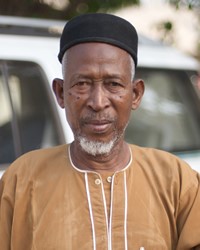Susu in Sierra Leone

Photo Source:
Julien Harneis - Flickr
Creative Commons
|
Send Joshua Project a map of this people group.
|
| People Name: | Susu |
| Country: | Sierra Leone |
| 10/40 Window: | No |
| Population: | 206,000 |
| World Population: | 2,857,600 |
| Primary Language: | Susu |
| Primary Religion: | Islam |
| Christian Adherents: | 0.06 % |
| Evangelicals: | 0.06 % |
| Scripture: | Complete Bible |
| Ministry Resources: | Yes |
| Jesus Film: | Yes |
| Audio Recordings: | Yes |
| People Cluster: | Susu |
| Affinity Bloc: | Sub-Saharan Peoples |
| Progress Level: |
|
Introduction / History
The Susus moved to their present locations in West Africa after 1725, when the Fulani attempted to dominate them and managed to convert them to Islam. The Susu language, called Soso or Susu, serves as a major trade language in West Africa and is almost indistinguishable from the language of the Yalunka. This close linguistic relationship supports the theory that the Susu and the Yalunka were once members of the same tribe. They were separated by Fula invaders, who forced the Susu to travel southward, absorbing other peoples in the process.
The Susus live in various countries of West Africa including Sierra Leone.
What Are Their Lives Like?
Like related ethnic groups in West Africa, the Susu have a caste system. There is a great distance between the status of those from lower castes than their “superiors.” Many crafts and even musicians have separate castes in Susu society.
The Susu are primarily farmers. Rice and grain are the two principal crops; however, they also grow pineapples, coconuts and mangoes. The women produce palm oil from palm nuts, as well as peanut oil and soap. In addition to farming, fishing and salt production are important enterprises to the Susu economy. Salt is produced during the dry season, and it can take up to three months of intense work to produce anything substantial. The Susu are also well known for their trading, leather work and metal work.
Susu houses are made of cement blocks or mud depending on available resources. The roofs of the urban homes are usually made of corrugated iron, while those in the more rural areas are still thatched. Houses are often built large enough to accommodate extended families. Although electricity is available in most places, cooking is still done over open fires. Unfortunately, clean, running water is seldom available for the Susu.
Although Western clothing is available in the markets, most of the Susu women prefer wearing their traditional African styles, which include long skirts that usually reach their ankles. Older men commonly wear loose fitting cotton robes, while the younger men prefer Western style clothes.
Relationships are very important in the Susu culture, yet there are many conflicts between neighbors. These disputes frequently involve disagreements over money or property. The extended family is also very important in their society. Polygyny (having multiple wives) is allowed under Muslim law but is only practiced by those who can afford it. Each village tends to have its own "wise man," as well as an elected or appointed leader whose task is to help resolve conflicts.
What Are Their Beliefs?
The Susu in Sierra Leone are almost entirely Muslim, and Islam dominates their religious culture and practices. The Friday meeting at the mosque is an important social and religious event. Most of the standard Muslim religious festivals are observed. Their most important festival is the celebration at the end of Ramadan, which is a month long period of prayer and fasting.
They also believe that ghosts, spirits and gods all inhabit the same land, and that witches have the power to change into animals and cause harm to their villages.
What Are Their Needs?
Because of the history of Christianity throughout West Africa, the Susu have the chance to hear of the lordship of Christ. The New Testament is available in their language. However, there are only a handful of known Susu believers in this region. They need the spiritual hunger it takes to seek and find the only savior.
Prayer Points
Ask the Holy Spirit to stir the hearts of the Susu youth and reveal to them that only Jesus can fill their lives with true peace.
Pray for God to raise up a generation of Susu people who have such a hunger for truth and righteousness that they will embrace Jesus no matter what the cost.
Pray that the Lord will raise up laborers who understand African Muslim culture and who can effectively take the gospel to these precious people.
Pray for the salvation of key Susu leaders who will boldly declare the gospel.
Ask God to raise up churches that plant more churches among the Susu in Senegal.